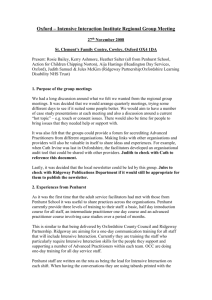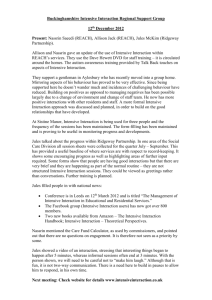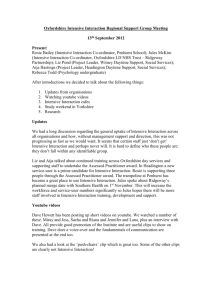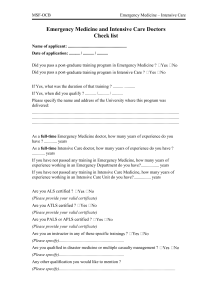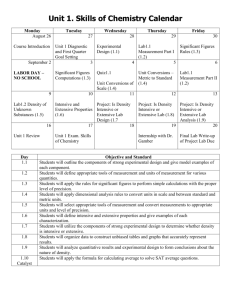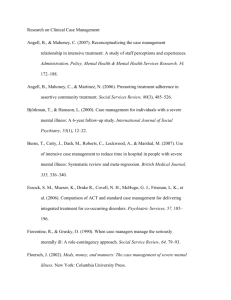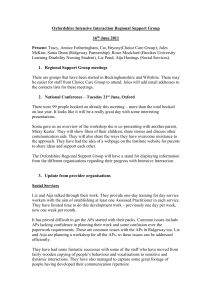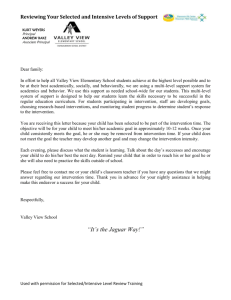Oxford - Regional Group Meeting Minutes
advertisement
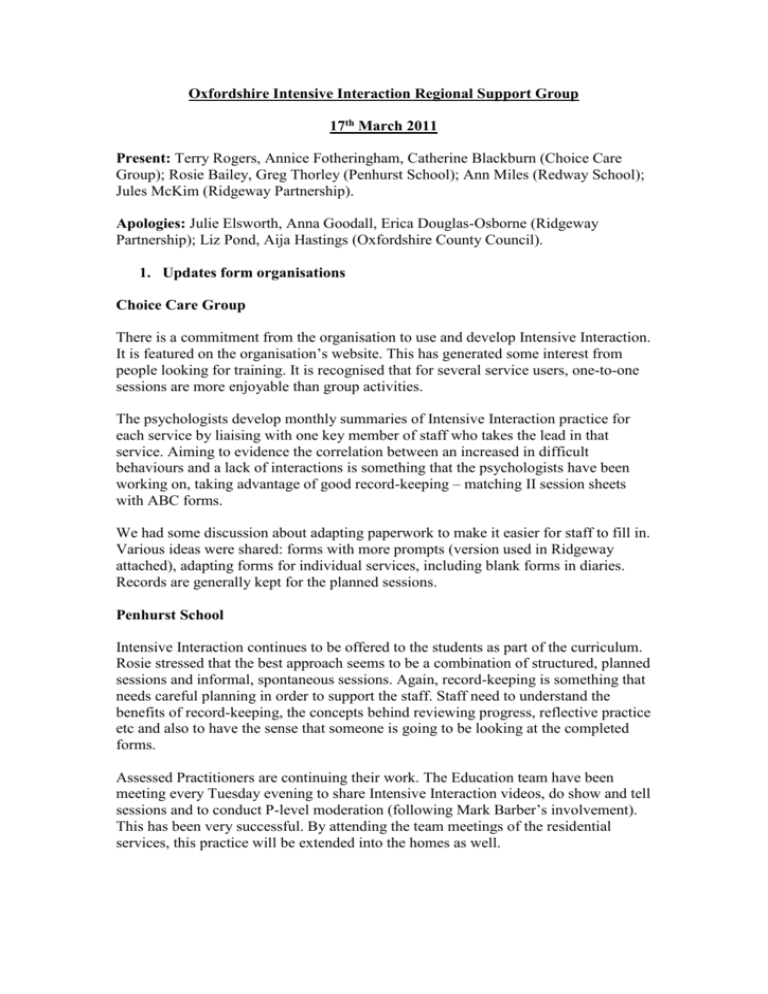
Oxfordshire Intensive Interaction Regional Support Group 17th March 2011 Present: Terry Rogers, Annice Fotheringham, Catherine Blackburn (Choice Care Group); Rosie Bailey, Greg Thorley (Penhurst School); Ann Miles (Redway School); Jules McKim (Ridgeway Partnership). Apologies: Julie Elsworth, Anna Goodall, Erica Douglas-Osborne (Ridgeway Partnership); Liz Pond, Aija Hastings (Oxfordshire County Council). 1. Updates form organisations Choice Care Group There is a commitment from the organisation to use and develop Intensive Interaction. It is featured on the organisation’s website. This has generated some interest from people looking for training. It is recognised that for several service users, one-to-one sessions are more enjoyable than group activities. The psychologists develop monthly summaries of Intensive Interaction practice for each service by liaising with one key member of staff who takes the lead in that service. Aiming to evidence the correlation between an increased in difficult behaviours and a lack of interactions is something that the psychologists have been working on, taking advantage of good record-keeping – matching II session sheets with ABC forms. We had some discussion about adapting paperwork to make it easier for staff to fill in. Various ideas were shared: forms with more prompts (version used in Ridgeway attached), adapting forms for individual services, including blank forms in diaries. Records are generally kept for the planned sessions. Penhurst School Intensive Interaction continues to be offered to the students as part of the curriculum. Rosie stressed that the best approach seems to be a combination of structured, planned sessions and informal, spontaneous sessions. Again, record-keeping is something that needs careful planning in order to support the staff. Staff need to understand the benefits of record-keeping, the concepts behind reviewing progress, reflective practice etc and also to have the sense that someone is going to be looking at the completed forms. Assessed Practitioners are continuing their work. The Education team have been meeting every Tuesday evening to share Intensive Interaction videos, do show and tell sessions and to conduct P-level moderation (following Mark Barber’s involvement). This has been very successful. By attending the team meetings of the residential services, this practice will be extended into the homes as well. Oxfordshire Learning Disability NHS Trust (Ridgeway Partnership) The Co-ordinator is focusing on seven key services across Oxfordshire. All staff are receiving the training and follow-up support in the form of visits to the homes. The Intensive Interaction Service Development Schedule (Graham Firth) is being used at team meetings to formulate action plans. This way of working is proving successful. As part of the psychology services of the Learning Disability Teams across Oxfordshire, Buckinghamshire and Wiltshire, the service continues to be referred clients to support with this approach. This always involves training for the staff team and a number of follow-up visits to embed the practice. Assessed Practitioners continue their work, though there are not so many at present compared to the number who started. Ridgeway Partnership is auditing the development of Intensive Interaction across their services. This is at the planning stage at present. The conference organisation is going well. The Andrew Sims Centre are very nearly finished working on the flier for the conference and this will be shared with all when it is ready. It looks set to be a great, interesting and informative day. Jules mentioned a need for an easy-read guide to Intensive Interaction for support staff who may not have English as a first language. Graham Firth is going to call for any leaflets or articles already written in this style in his next newsletter. Rosie mentioned something has been developed by Nottingham PCT. Redway School Intensive Interaction has always been part of what the school has done, but there has been renewed interest of late, as a result of the development of the curriculum. It seems as if there is more flexibility and creativity within the National Curriculum now so that targets can be achieved in other ways. Dave Hewett has provided introductory training and Ann will go on a co-ordinator’s course in April. From September onwards she will have some dedicated time to develop the approach for the students. There is good support from all levels for developing Intensive Interaction. More videoing of interactions is taking place now. The school intake has also changed and there are now more students with profound and multiple learning disabilities. 2. National Conference – Tuesday 21st June, Oxford Details will be circulated as soon as they are available. There will be some space for poster presentations from Regional Support Groups. If we can have our next meeting just before the conference (Thursday 16th June) this will be a good chance to collect together any visual displays from all organisations who are a part of this group. 3. Newsletter The next issue is the Spring issue so needs to be out before spring ends! Any articles, questions, photos, case studies please email to Jules by April 27th please. An update from Choice on the people they have featured previously was discussed. 4. Videos Various videos were shared: Rosie spending time with a boy with a head injury. The interaction was subtle, based on blinks and tongue clicks. Raising Our Sights – James’s story. Intensive Interaction features as part of his daily life. Copies will be made and distributed. Ellen demonstrating how interactions can be mutually enjoyable – fits of laughter for 10 minutes! Jules meeting someone for the first time, using touch and becoming more aware of visual limitations and how to adapt next time. 5. Discussion – working with people who may challenge There were some very useful discussions around this issue. The issue was raised by Jules who has been approached to offer advice for the team who support someone who has violent and aggressive behaviour. Also with reference to a student who spends a lot of time spitting. Ideas included: Ensure you interact in a safe place – safe for both if you. Follow his interests and spend time just doing that activity. Aim to become a friend first. Take time and bear in mind there may be no eye contact or proximity for some time. Ensure mutual respect and trust and aim to develop these qualities. Identify his strengths – what is he good at? Can he do things for us and contribute in some way, i.e. doing something he enjoys. Sometimes people may sabotage or terminate the activity as it maintains their control – easier to reject someone than be rejected yourself, despite the person and the activity being enjoyable. Aim to avoid “telling off” and negative communication. Choose carefully who will interact with the person. Build in time for debriefing and time out. Be careful to ensure that pain as a cause of behaviour is not being overlooked. Rather than echoing the spitting or self-injurious behaviour, is there another feature of their repertoire that can be used to respond? 6. Other issues discussed Consent has been an obstacle for some – a lack of consent has held back the development of Intensive Interaction as no videoing possible. Perhaps in some services different roles are needed – domestic staff who maintain the physical environment and staff who engage with the people who live there. The importance of humour in interactions. Finding what makes people laugh! Though be careful not to overdo “making the person laugh.” How to know when to stop a session. A person support by Choice has different levels of pushing staff away. It is important not to end the session at the first push as it may be simply that he wants the specific features of the current interaction to change, not to finish completely. When training staff, how to emphasize the balance between not over-estimating someone’s communication skills, but also not to under-estimate expectations. If someone has greater receptive skills than expressive skills, the question to ask is when do they get the chance to be in control of the communication? 7. Next meeting Thursday 16th June 1pm to 4pm, Ridgeway Partnership Slade House, Horspath Driftway, Headington, Oxford OX3 7JH Please bring any materials to showcase how you use Intensive Interaction.
